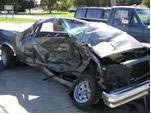Torts

What are International Torts?
The owner could sue the person who wrecked this car in tort
Torts Definition
Torts meanings are ‘civil wrong’. In order to have behaved tortiously, one must have breached a duty to another person, or infringed some pre-existing legal right. A simple example might be accidentally hitting someone with a cricket ball[6]. In the law of negligence, the injured party has a claim. Another example might be your neighbour making extremely loud noises with machinery on his property[7]. You could have a claim under the law of nuisance. Torts Law can also involve intentional acts, such as assault, battery or trespass. Of the more infamous torts are defamation, for example when a newspaper libels a politician[8] or economic torts, which form the basis of labour law in attacks upon trade unions[9].
Donoghue v. Stevenson[10] illustrates the principles of the modern tort of negligence. Mrs Donoghue ordered an opaque bottle of ginger beer in a cafe in Paisley. Having consumed half of it, she poured the remainder into a tumbler. The decomposing remains of a dead snail floated out. She fell ill and sued the manufacturer for carelessly allowing the drink to be contaminated. The House of Lords decided the manufacturer liable in negligence for Mrs Donoghue’s illness, because he fulfilled the four criteria. The manufacturer had a duty of care to Mrs Donoghue, because (1) it was reasonably foreseeable that he put her at risk of harm (2) he breached his duty of care (3) his breach caused her harm and (4) the harm was not such a remote a consequence.
